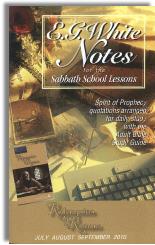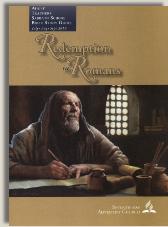|
||||||||||||||
Commentary on "Victory Over Sin"
Day 3: Monday, August 16, 2010 - Is the Law Sin?
Overview
Today’s lesson attempts to clarify why only some parts of the law are abolished. It now states that throughout Romans, the word “law” can refer to the whole “system introduced at Sinai,” or just part of it. That system included the 10 Commandments. However, when that system ended with Christ’s death, the Ten did not end. Even though Paul mentions the tenth commandment and says we are released from the law, we are not released from that part of the law. The Ten express the “moral law” which existed before Sinai, and will ever after.
The purpose of the law is, the lesson explains, to reveal God’s will to us and make us aware of our sins. When the person becomes awakened to the reality that he is under condemnation of death, “in a sense,” he dies. So the law reveals God’s will and shows us our need of salvation, but does not provide the means for it.
Observations
Today’s explanations about what parts of the law were abolished and what parts are eternal adds to the confusion and ignores what Paul is actually saying about the law. We are left with no clear rule on how to decide which parts of the law Paul is speaking of. A plain reading reveals that Paul means the entire law when he says we have died to it and are released from it. The whole law condemns us, reveals sin as “exceeding sinful,” and drives us again and again to Christ.
What does Paul mean, “But now we are released from the law, having died to that which held us captive” (7:6)? He had just stated the reason why we must die to the law in the previous verse. Our sinful passions are aroused by the law, and cause us to “bear fruit for death.” How can a commandment to do something good arouse evil in us? Paul goes on to explain. It is not because the law is sin, “By no means!” The law is good because it shows him what sin is. But sin which dwells within him, rebels and uses the law as an opportunist, deceives him into thinking that his law-abiding is righteousness, and brings him into even greater sin.
This is a hard concept for Adventists, and for any Christians who believe that the law is the means to victorious Christian living. They cannot see how a good and holy law can team up with our sinful natures and produce greater sin. That seems contradictory. However, that is exactly what Paul is saying. Sin is more than just bad behavior. It is a rebellious principle that resides and rules in our bodies. It uses the law to fulfill its own agenda for completely nefarious purposes, so we do our worst. Because the flesh is weak, we succumb to it easily. That is why Paul could say that the “power of sin is the law (I Cor. 15:56).”
But just how does that work, how do we use the law to deepen our sin? Here’s an example. An earnest church member wants to keep the Sabbath, so he scours the entire Bible, making a list of things to do and avoid on the Sabbath day. He is careful to guard the edges of the Sabbath; he and his wife never cook on that day, he carefully avoids talking about secular things, and so on. After he develops these habits, he notices that other church members are not as careful in their Sabbath-keeping. He feels he must avoid others who might distract him from his good behaviors. He begins to experience some pride and accomplishment after comparing himself with others. He feels he must be making progress towards being “safe to save.”
So now his behaviors have an appearance of goodness, but he has deepened his sin by adding pride and self-reliance to his breaking all the commandments. He is corrupting the Word of God by using it to satisfy his carnal desires, to feel superior and worthy of blessings. We might say that he was once alive, but then along came the Sabbath laws, sin sprang up, and he died. The sin, always present with him, used the Sabbath to express pride in more elaborate, more insidious ways. Because of our sin, we can take the best laws God gives, and turn them into instruments of death. The power of sin is the law, and that is why we must die to it, all of it. This reality remains as long as we are living in these “bodies of death.” Only a new body will change that ugly fact.
The key to victorious living cannot be through any use of the law. Even though it is hard for us to imagine a righteousness apart from the law, God has provided His alien, outside-of-us righteousness. Law righteousness will only lead to a “knowledge of sin (Romans 3:20).” Self improvement through law only empowers sin. Victorious living that overcomes the world is our faith, faith in Jesus who keeps His promises and forgives our sins. This week we will look at what kind of ministry God provides for true holy living.
Summary
- The entire law condemns us, and it is the entire law to which Paul is writing in Romans 7.
- The law stirs up sinful passions in us, not because the law is sin, but because our sinful natures use the law as an opportunity to rebel.
- Law and innate sin work together. Sin uses the law to express its evil agenda, and because we are flesh, we succumb to it.
- Our sinful natures will use the Sabbath to express pride and self-sufficiency before God. Instead of the law making us better, we always use it to establish our own worth. This will remain true until we have new bodies.
- Victorious living comes through faith in Jesus who keeps His promises and forgives sins.
Copyright 2010 BibleStudiesForAdventists.com. All rights reserved. Revised August 15, 2010. This website is published by Life Assurance Ministries, Glendale, Arizona, USA, the publisher of Proclamation! Magazine. Contact email: BibleStudiesForAdventists@gmail.com.
The Sabbath School Bible Study Guide and the corresponding E.G. White Notes are published by Pacific Press Publishing Association, which is owned and operated by the Seventh-day Adventist church. The current quarter's editions are pictured above.
Official Adventist Resources
Standard Edition Study Guide Week 8
Teacher's Edition Study Guide Week 8
Easy Reading Edition Study Guide Wk 8
Search the Complete Published Ellen G. White Writings


